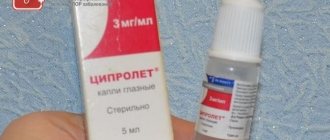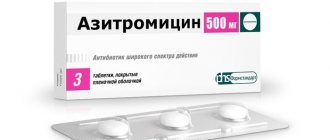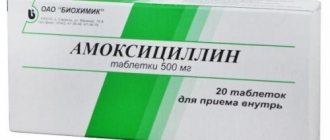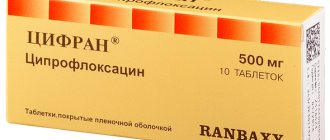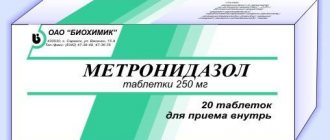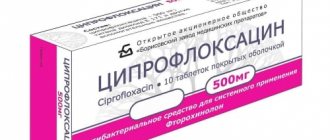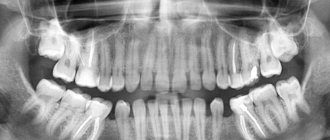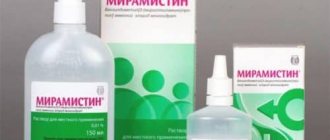Author's rating
Author of the article
Shutofedova Ksenia Yurievna
General practitioner
Articles written
578
about the author
Sore throat, or inflammation of the tonsils, is a disease caused by a bacterial, less often viral or fungal provocateur. Accompanied by pain in the throat, changes in the tonsils, swelling of the mucous membranes, and increased temperature. Antibiotics are a proven remedy for tonsillitis, but there are situations in which the use of popular medications does not help eliminate the disease. Otolaryngologists recommend Tsiprolet for sore throat - an equally effective antibacterial prescription. Read about the features of the reception, advantages and disadvantages in our article.
Properties and composition of the drug
Tsiprolet is used for sore throat caused by pneumococcus, meningococcus, streptococcus, staphylococcus, Haemophilus influenzae, tuberculosis and Pseudomonas aeruginosa. The product is based on ciprofloxacin, a synthetic antimicrobial component of the fluoroquinolone group. According to pharmacokinetics, fluoroquinolones are not classified as antibiotics, despite their identical effects on pathogens. The bactericidal property is based on the destruction of the DNA of the bacterial agent, which leads to sterilization and prevents reproduction.
Ciprofloxacin for angina is recommended in case of persistent rejection of penicillin and antibiotics of other groups (tetracyclines, cephalosporins and macrolides). Despite the effectiveness of the medicine, the main component is characterized by a serious list of side effects and contraindications. For this reason, a doctor prescribes Tsiprolet for a sore throat only when the benefits of use outweigh the harm. In addition, the main provocateurs of sore throat - streptococci and staphylococci - often demonstrate resistance to ciprofloxacin. In such cases, the use of the drug will not cause positive dynamics.
When adding Tsiprolet to the therapy protocol, the otolaryngologist performs a bacteriological culture of the provocateur and analyzes the degree of resistance of the strain against the drug.
When a sore throat is diagnosed, Tsiprolet shows high bioavailability when taken, and the concentration of the active component in the blood is achieved in a short time, localizing in the soft tissues (including the tonsils and mucous membranes of the oropharynx). This property has popularized its use in the treatment of acute stage angina. Unlike antibiotics, the medicine does not cause pathological changes in the microflora of the intestines and genital organs.
The drug was produced in the form of tablets, which differ in the proportion of the main substance: 250 mg or 500 mg. An additional form of release is a solution for intravenous administration, which is used in a hospital for severe pathology.
Tsiprolet helps against sore throat in adults, but is not recommended for children under 15 years of age. Fluoroquinolones, when entering a growing organism, act not only on pathogenic microorganisms, but also affect healthy cells. The adult’s immune system copes with this impact, while the weaker child’s immune system fails, resulting in impaired bone formation.
Tsiprolet for children: instructions for use
Antibiotics are not allowed for children under 18 years of age during active growth.
If the clinical picture of the disease is complicated, then taking the drug Tsiprolet is allowed under strict medical supervision from the age of 15, and the dosage must be calculated and adjusted individually.
The recommended dose for eliminating complications caused by Pseudomonas aeruginosa in pulmonary cystic fibrosis in children aged 5-17 years is 20 mg per 1 kg of body weight every 12 hours (the maximum daily dosage for a child should not exceed 1500 mg). The course lasts 10-14 days.
For the treatment and prevention of pulmonary anthrax, you need to take 15 mg per 1 kg of body weight every 12 hours . The maximum dose per dose for a child should not be more than 500 mg, and the daily dose should not be more than 1000 mg. The course lasts 60 days.
How to take Tsiprolet for sore throat
Depending on the degree of pathology, the otolaryngologist will prescribe medication in the form of injections or tablets. It is advisable to take the drug for tonsillitis in the following cases:
- identifying purulent formations on the tonsils;
- febrile temperature for 2-3 days;
- antibiotic therapy did not lead to improvement of the condition;
- the threat of secondary infection.
For purulent tonsillitis, Tsiprolet is used as a solution for intravenous administration. For this purpose, a medicinal release is used in bottles of 100 or 200 ml, which includes 200 and 400 ml of ciprofloxacin. The medication is administered in a hospital through a dropper with a frequency of 2 doses per 24 hours. The duration of the manipulation is half an hour. Visible results of therapy (on days 2-3) provide grounds for switching to tablets.
They are produced with a dosage of the main component of 250 mg and 500 mg. Ciprofloxacin for angina is prescribed in an amount of at least 500-750 mg per 24 hours. This means that the indicated dose is divided into 2 doses with equal intervals between them, since the reactivity of the drug manifests itself over 12 hours. Depending on the treatment protocol, it is permissible to take 1 tablet of 250 mg in the morning and a similar tablet in the evening. If necessary, a tablet containing 500 mg of the drug is divided in half (into 2 doses).
To achieve results, it is important to follow the rules:
- simultaneous use of medication and products containing a lactic acid component reduces the effectiveness of treatment;
- Alcohol is not allowed during Tsiprolet therapy;
- It is not recommended to use mineral complexes and vitamins when treating with this drug;
Tsiprolet for angina in adults in the form of tablets is taken on an empty stomach to enhance effectiveness. A mandatory rule is to take the medicine with a large volume of water. Otolaryngologists recommend increasing fluid intake when taking Tsiprolet: this way they ensure minimal negative effects on the kidneys and reduce the likelihood of salt formation in the urine.
The duration of therapy is 7-10 days, depending on the patient’s condition and the level of immune defense. It is not recommended to stop treatment for 3-5 days, when positive changes are obvious to the patient and the doctor: in this case, it is necessary to take the medicine for at least 3 days to consolidate the result.
Tsiprolet tablets 250, 500 mg: instructions for use
The tablets must be taken orally on a full stomach with a small amount of water. When taken on an empty stomach, the active ingredient is absorbed more quickly.
The duration of treatment is determined by many indicators:
- development of the disease,
- type of infection
- age;
- state of immunity,
- features of the kidneys and liver.
Antibacterial therapy does not stop after the removal of disturbing symptoms; it is recommended to take the tablets for another 2-3 days. The duration of treatment is determined by the attending physician.
Contraindications and side effects
Despite the effectiveness of the drug, otolaryngologists are afraid to prescribe it due to the list of side effects during treatment. The manifestations are reversible, but mean that Tsiprolet is not suitable for tonsillitis for the patient and it is necessary to change the treatment protocol.
Contraindications to the drug include:
- age up to 15 years;
- period of pregnancy and lactation;
- individual intolerance to ciprofloxacin;
- mental instability;
- tendency to epileptic seizures;
- liver and kidney pathologies;
- atherosclerosis of cerebral vessels and problems with cerebral circulation;
- Treatment of older patients occurs according to an individually developed program that takes into account medical history, level of resistance, and general health;
- patients whose professional activities are related to high-precision production, machines, mechanisms, and driving vehicles.
Tsiprolet is characterized by good tolerance among patients. An extensive list of side effects does not require hospitalization and goes away after discontinuation of the drug. However, the occurrence is regarded as a reason to cancel the drug and replace it with an analogue. Negative manifestations when taking the drug:
- change in taste preferences, nausea, vomiting, loose stools, loss of appetite;
- liver failure, jaundice and hepatitis;
- arrhythmia, tachycardia;
- headaches and dizziness, loss of orientation, anxiety, depression, visual and hearing disorders;
- rash, redness, itching, urticaria, dermatitis, scabies on the skin; rarely - Quincke's edema and anaphylactic shock;
- painful urination due to the formation of salts, the presence of bloody impurities in the urine;
- changes in blood parameters (decrease in the level of leukocytes, erythrocytes and platelets, increase in sugar);
- changes in intracranial pressure leading to nosebleeds, convulsions, and blood clots;
- bronchospasm, hyperemia of lung tissue, asthma;
- arthritis, muscle pain;
- colitis;
- leukopenia.
Among the diagnosed side effects when treating angina with ciprofloxacin, patients most often note persistent insomnia, with normal sleep returning after the end of the treatment protocol. Among additional treatment conditions, doctors recommend refraining from:
- alcoholic and low-alcohol drinks;
- exposure to open sun;
- driving vehicles.
Contraindications
- with a deficiency of glucose-6-phosphate dehydrogenase,
- during pregnancy and breastfeeding,
- pseudomembranous colitis,
- under 18 years of age,
- with sensitivity to the components of the drug and drugs of the fluoroquinol group.
You should take antibiotics with caution if:
- significant atherosclerosis of the brain vessels of the head,
- cerebral circulatory disorders,
- mental disorders,
- seizures, including epilepsy
- kidney failure, liver failure,
- after the age of 60 years.
Tsipromed or Tsiprolet which is better
Despite the identical active ingredient (ciprofloxacin), Tsipromed and Tsiprolet differ in their scope of application and release form. The first remedy is effective for eye diseases and pathologies of the hearing aid caused by a bacterial provocateur; Available in the form of drops with antibacterial properties. The second is effective for sore throat and tonsillitis of identical origin; it is produced in the form of tablets and liquid for injection.
Tsipromed is an effective prescription for otitis media accompanying bacterial tonsillitis. The use of ciprofloxacin-based ear drops can quickly relieve pain and inflammation of the middle ear cavity.
Like Tsiprolet, the medicine is not prescribed to pregnant women, nursing mothers, or children under 12 years of age. The cost of appointments is in one price category.
How does Ciprolet work?
One of the important advantages of the drug is the speed of its absorption into the blood from the digestive organs. The biological availability of the drug is about 50-85%, which is a good indicator. Approximately 1.5-2 hours after use, the drug accumulates in the body in the greatest quantity.
Tsiprolet smoothly spreads throughout the body, gradually penetrating into tissues and fluids - into muscles, lymph, blood and other organs.
The drug is concentrated in the liver, ovaries, prostate, bile, and tonsils. The largest amount accumulates in bile, kidneys, lungs, and uterus.
The antibiotic effectively destroys bacterial infection in various diseases, including it is used for sore throat in particularly acute manifestations, sinusitis, pharyngitis, and other infectious inflammations of the respiratory tract.
Tsiprolet or Augmentin - what to choose
Augmentin and Tsiprolet are effective for angina, but they belong to different pharmacological groups. For this reason, co-administration is unacceptable, as well as replacing one medication with another in the treatment protocol without medical permission. When prescribing a potent drug for tonsillitis, the doctor conducts a bacteriological culture to identify the resistance of the pathogen to antibiotics of the penicillin group, macrolides and cephalosporins. If the result is negative (means that the antibiotic is effective), Augmentin is prescribed along with Tsiprolet. When choosing between two medications, consider their positive and negative sides.
The advantages of Tsiprolet include:
- effectiveness against bacterial microorganisms resistant to penicillin antibiotics;
- minimal negative impact on the gastrointestinal tract;
- the use of Tsiprolet does not change the intestinal and vaginal microflora in women, does not cause dysbacteriosis, candidiasis and vaginosis;
- prolonged action of the drug (12 hours between doses);
- course duration is 5-7 days;
- low cost.
Cons of Tsiprolet:
- an extensive list of side effects;
- inadmissibility in the treatment of children under 15 years of age;
- Contraindicated for pregnant and lactating women.
In comparison with Tsiprolet, Augmentin is characterized by the following undeniable advantages:
- the synergy of the components (clavulanic acid and amoxicillin) helps quickly eliminate the provocateur of sore throat;
- the drug is approved for use by children from 3 months;
- with caution, but acceptable in the 2-3 trimester of pregnancy;
- the list of contraindications is much smaller.
The disadvantages of the medicine are:
- negative impact on the microflora of the stomach and genital organs;
- the cost is 2-3 times more expensive;
- Duration of therapy - from 7 days.
Based on the stated characteristics, we draw the following conclusions:
- Augmentin is preferable in the treatment of sore throat in children, older patients, expectant mothers, and patients who have no contraindications to penicillin therapy;
- Tsiprolet is recommended for adults and older patients with gastrointestinal pathologies and intolerance to antibiotics.
How to drink Tsiprolet: dosage
Recommended dosage for adults:
| Types of diseases | Single dosage (mg) | Reception per day | Course duration in days |
| Mild to moderate lower respiratory tract infections | 500 | 2 | 7-14 |
| Severe degree of infection of the lower respiratory tract | 750 | ||
| Acute sinusitis | 500 | 10 | |
| Mild to moderate infection of the skin and soft tissues | 7-14 | ||
| Severe lesions due to infection of the skin and soft tissues | 750 | ||
| Mild to moderate infection of bones and joints | 500 | 28-42 | |
| Severe infection of bones and joints | 750 | ||
| Diseases of the urinary system of infectious nature | 250-500 | 7-14 | |
| Uncomplicated form of cystitis | 3 | ||
| Chronic form of prostatitis | 500 | 28 | |
| Uncomplicated gonorrhea | 250-500 | 1 | 1 |
| Uncomplicated diarrhea | 500 | 2 | 5-7 |
| Typhoid fever | |||
| To prevent the consequences of surgical intervention | 250-500 | 7 | |
| In the treatment of sepsis and peritonitis | 500 | Every 12 hours | 7-14 |
| As a prophylaxis against pulmonary anthrax | 500 | 2 | 60 |
| Infections due to suppressed immunity (consequences that arise during treatment with medications that suppress the immune system or with neutropenia). | 250-500 | 28 |
Tsifran or Tsiprolet which is cheaper
Tsifran and Tsiprolet are effective prescriptions against sore throat. In addition to ciprofloxacin, Cifran contains tinidazole; this combination enhances the effect against tonsillitis provocateurs. Prevents division and leads to the death of bacterial microorganisms. A common tablet form (recommended for angina) includes 500 mg of ciprofloxacin, the daily dose for an adult is 1000 mg (there are also 1000 mg tablets available, in which case 1 Cifran tablet is taken per day).
Comparing the prices for both products (Cifran 500 mg and Tsiprolet 500 mg), we come to the conclusion that the cost of the first is 2-3 times higher. However, the final decision on prescribing Tsiprolet, Tsifran or Augmentin depends on the attending physician and the results of preliminary diagnostics.
Indications for use
If the cause of infectious and inflammatory processes in the patient’s body is microorganisms that are sensitive to ciprofloxacin, then a course of therapy with the drug Ciprolet tablets is prescribed. What do they help with:
- from infectious lesions of the respiratory tract. Bronchitis (acute, chronic form or during exacerbation), pneumonia, bronchiectasis, complications of cystic fibrosis caused by infection,
- from infections of the ENT organs. Acute sinusitis,
- from infectious lesions of the urinary system (bladder, kidneys). Cystitis and pyelonephritis,
- from chronic prostatitis caused by bacteria,
- from an uncomplicated form of gonorrhea,
- from typhoid fever,
- from diarrhea caused by infections, from campylobacteriosis, shigellosis, traveler's diarrhea,
- from infections of the skin and soft tissues (infected ulcers, wounds, burns, abscesses, phlegmon),
- from infections of bones and joints (osteomelitis, septic arthritis),
- from sepsis and peritonitis,
- from infections that occur against the background of immune deficiency caused by therapy with immunosuppressive drugs or neutropenia,
- as a prophylactic agent after surgical interventions,
- as a prophylaxis against pulmonary anthrax.
Tsiprolet in dentistry
Tsiprolet is widely used in dentistry along with other antibacterial drugs. Tablets of this antibacterial agent help against various types of inflammation and infections.
Doctors note that they are also effective in preventing suppuration after surgery.
After tooth extraction
Antibacterial therapy is necessary after tooth extraction, however, at the discretion of the dentist, it can be canceled or not used at all if the extraction was uncomplicated. Tsiprolet tablets are prescribed to be used in a course of 5 days, 2 times a day, one tablet, which reduces the risk of inflammation, suppuration and infection.
For toothache
When the drug Tsiprolet enters the body, it begins to be actively absorbed into the blood. The tablets quickly eliminate pain, relieve inflammation and destroy pathogens. The medicine acts for 4-5 hours, after which it is excreted through the kidneys, which is why it has earned its popularity and widespread use.
With flux
Antibiotics are effective for flux in the first stages, when an abscess has not yet appeared; then Tsiprolet should be used only after the formation has been opened. The usual course of treatment is 5 days, 1 tablet every 12 hours.
Tsiprolet for bronchitis
In cases where the cause of bronchitis is a bacterial infection, there are grounds for prescribing antibacterial therapy. If pus appears in the sputum or with frequently recurrent bronchitis, antibiotics are also prescribed. The advantage here is given to drugs in tablets.
Tsiprolet helps well in the initial stages of bronchitis or when other drugs have proven useless. The course of treatment and dosage are prescribed after examination and consultation with a doctor. Typically, taking Tsiprolet lasts no more than 10 days, one tablet 2 times a day.
For sore throat
In case of dangerous conditions of purulent sore throat and allergies to other antibacterial agents, Tsiprolet tablets are prescribed, which makes them indispensable in the treatment of this disease. Often, in the acute form of tonsillitis, antibacterial drugs of the penicillin and macrolide series are powerless.
For severe angina, Tsiprolet is used in the form of an infusion solution.
The recommended dosage of the drug in tablets for an adult for the treatment of sore throat is half a tablet 2-3 times a day. You need to take the drug for 7 to 10 days.
For severe forms, 1-1.5 tablets are prescribed 2-3 times, also for 7-10 days. When the symptoms become less active, the drug is continued for another 3 days. For purulent sore throat, the drug is prescribed in an individual dosage for a course of 3-4 weeks to prevent complications.
Medicine Tsiprolet for sinusitis
Tsiprolet for sinusitis is used when bacterial infections are attached to it. The drug has side effects, which is why it is used in cases where treatment with other drugs has proven ineffective.
Adults are recommended to take 1 tablet of Tsiprolet 2 times a day for 5-7 days, depending on the severity of the disease.
Tsiprolet in gynecology for cystitis in women
Tsiprolet can be taken at any stage and for any degree of cystitis. The dosage is prescribed by the doctor based on the patient’s data – age, weight, as well as the severity of the disease and the presence of concomitant diseases.
The recommended dosage for the treatment of cystitis in women is 2 tablets per day with a break of 12 hours. The course lasts from 5 to 14 days. Experts advise women with kidney dysfunction to reduce the dosage of the drug by 2 times.
For prostatitis
In acute forms of prostatitis, the drug Tsiprolet is administered by the enteral route; after it enters the remission stage, tablets are prescribed. Switching to oral administration is possible on the 4th day of the injection course.
The recommended dosage of tablets for men with prostatitis is 500 mg every 12 hours. The appointment lasts 10 days and can be extended at the discretion of the doctor. It is also worth noting that in the presence of kidney or liver dysfunction, the dosage of Tsiprolet should be reduced by 2 times.
Features of using Amoxiclav
Amoxiclav belongs to the broad-spectrum drugs of the penicillin group.
The drug contains amoxicillin, as well as clavulanic acid (an analogue is Augmentin), which blocks the bacterial enzyme beta-lactamase, which breaks down amoxicillin. Amoxiclav is dangerous for the following pathogenic microorganisms:
- streptococci;
- staphylococci;
- bacteria that cause salmonellosis;
- bacteria that cause brucellosis;
- enterococci;
- listeria;
- Moraxella;
- proteas;
- Klibsiella;
- Listeria, Moraxella, Protea, Klebsiella, Shigella and many others.
https://www.youtube.com/watch?v=ytcopyrightru
According to the instructions for the drug, Amoxiclav can be used for the following diseases:
- pneumonia and bronchitis;
- tonsillitis, otitis;
- inflammation of the genitourinary system;
- chronic cholecystitis;
- gonorrhea;
- infections on the skin;
- ailments in the field of gynecology.
Treatment of children with Amoxiclav is contraindicated for atopic dermatitis and bronchial asthma. Also, the use of the drug is unacceptable if the child has an intolerance to some components, or if the body showed an allergic reaction after the first use of the drug.
Also, Amoxiclav should not be used for diseases such as lymphocytic leukemia, infectious mononucleosis - against the background of an underlying disease, kidney and liver diseases of any etiology that impair the functioning of these organs
Amoxicillin-based medications should not be used simultaneously with:
- substances of the tetracycline group;
- sulfonamides;
- macrolides.
Despite the fact that the body’s adverse reaction to Amoxiclav is not pronounced and has a transient tendency, you should consult a doctor before using Amoxiclav for the first time.
From the digestive system:
- decreased appetite;
- stool disorder;
- nausea and vomiting;
- pain in the abdominal area;
- liver dysfunction;
- icterus of the sclera, skin and mucous membranes;
- hepatitis;
- colitis.
From the nervous system:
- headache;
- increased activity;
- lack of sleep;
- convulsions;
- increased feeling of anxiety.
Urinary system reaction:
- nephritis (interstitial);
- stone formation.
Allergic manifestations:
- nettle fever;
- itching;
- anaphylaxis;
- angioedema;
- Stephen-Jones syndrome;
- Ritter's dermatitis and many others.
We invite you to read: How dentists recommend caring for a dental guard
